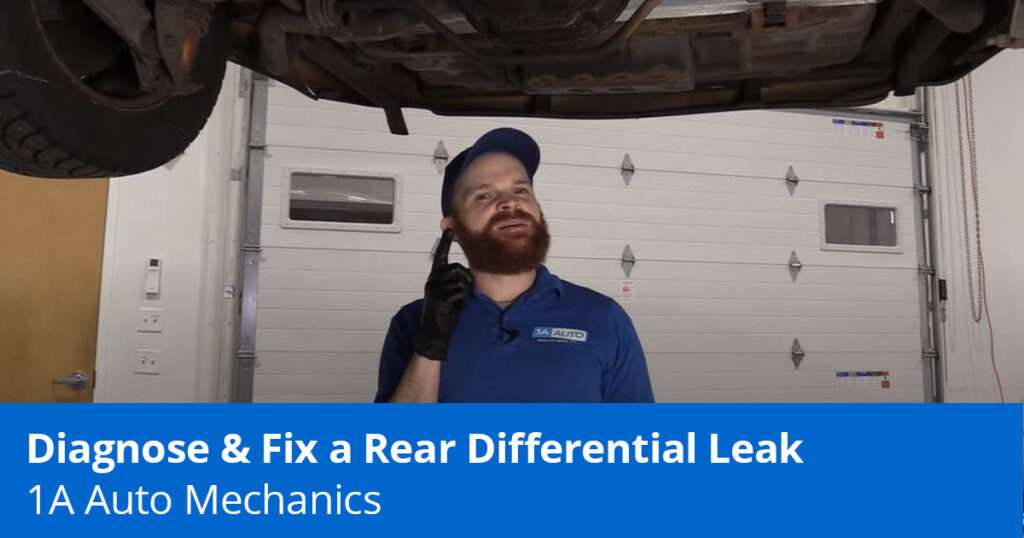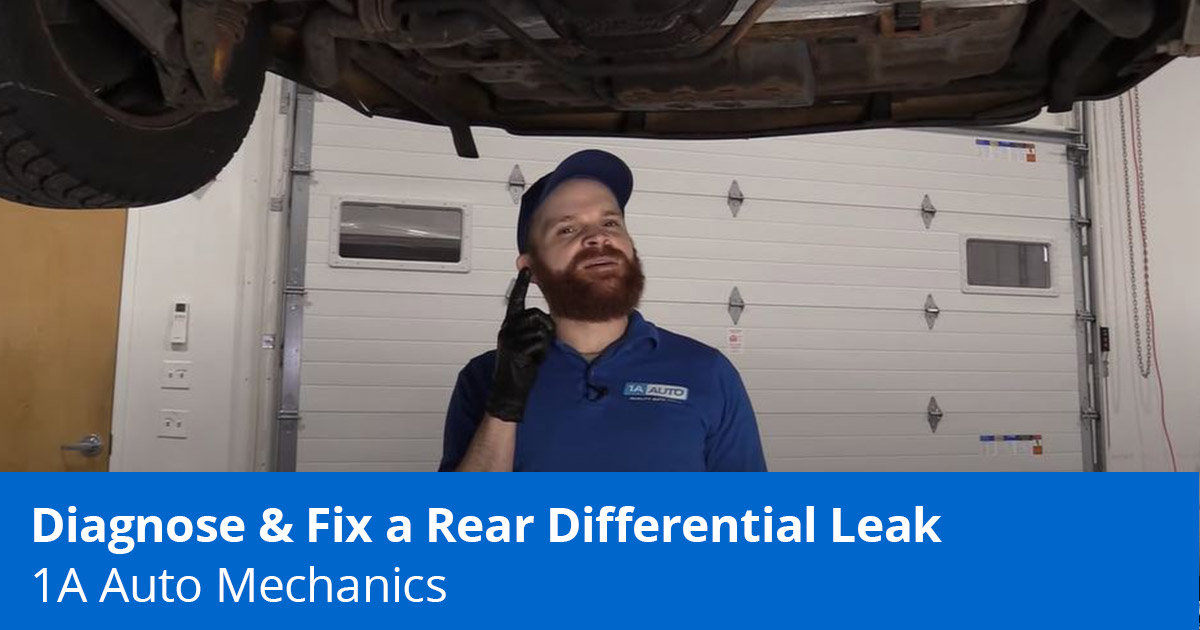
If you notice oil spots underneath the rear end of your car or truck or dirt and debris is accumulating along the undercarriage, you may have a rear differential leak. This post reviews a simple process for checking the rear differential for a differential leak, pinion seal leak, or axle seal leak, and how to stop and fix it if the rear end is leaking.
Video: How to Diagnose Rear Differential Leak
How to Find, Fix, and Stop a Rear Differential Leak
1. Check the Rear Pinion Seal for Leaks

Start at the center of the differential. The enlarged protruding part of the differential is sometimes called the pumpkin. The front area of it where it connects to the driveshaft is the pinion seal. If there is a leak at the pinion seal, it will drip down the differential. If the center of the differential is coated in differential fluid, it’s likely because the pinion seal is leaking.
How to Fix the Rear Pinion Seal
To fix the pinion seal, the driveshaft will need to be removed.
General Steps for Removing the Pinion Seal
- Remove the Bolts from the Driveshaft
Loosen and remove the bolts from the driveshaft
- Loosen the Driveshaft
Tap the driveshaft with a rubber mallet to loosen it
- Separate and Lower the Driveshaft
Separate the driveshaft. If the exhaust pipe is in the way, the exhaust needs to be dropped, otherwise, the driveshaft can hopefully lower safely.
- Remove the Pinion Nut
Once the driveshaft is removed, remove the nut from the yoke
- Remove the Yoke
Tap the yoke loose with a rubber mallet to remove it to access the pinion seal
- Remove the Pinion Seal
Remove the pinion seal and clean the area thoroughly
- Reverse These Steps to Reinstall
Install a new pinion seal, and connect the yoke and tighten it. Connect the driveshaft to the yoke, tighten the bolts and torque them to the manufacturer’s specifications.
- Check the Differential and Transmission Fluid
Refill the differential fluid level and the transmission fluid level if any fluid has escaped.
2. Check the Differential Cover for Leaks

The differential cover is on the backside of the differential. If the differential cover is a separate part from the differential, there will be a seal. If the seal is leaking, differential fluid will be leaking from the side of the cover and draining along the bottom. The differential cover may have darkened areas.

How to Fix the Differential Cover
General Steps for Fixing a Leaking Differential Cover
- Grab a drain pan
- Loosen the bolts from the differential cover
- Pry the differential cover off
- Let the differential fluid drain
- Remove the gasket from the differential pan
- Clean the differential pan and clean the differential
- Place a new gasket on the cover
- Replace the differential cover
- Tighten the bolts and torque them to the manufacturer’s specifications
- Fill the differential with new differential fluid
- Take the vehicle for a road test
3. Check the Bottom of the Rear Differential Tube for Leaks

You may see a leak along the bottom of the differential tube, which means the differential tube is leaking. If moisture collects along the bottom of the differential tube, it can rot the tube and cause a leak. Some vehicles may have a sticker along the bottom of the differential tube that can collect moisture and cause rotting. Rot will build up underneath the sticker and sometimes if the sticker is removed, you can see the moisture and fluid seeping from the differential tube.
How to Fix Rotting on the Differential Tube
This is an indicator of a big problem and means the differential will need to be replaced or overhauled.
4. Check the Differential Vent Tube for Clogging

Along the top of the differential, generally on the differential tube or the pumpkin, there will be a vent tube, which vents the air inside the differential. Make sure that the vent tube is not missing or plugged.
5. Check the Axle Seals for Leaks

As noted in our most common problems of the 1st gen Nissan Titan, differentials can also leak at the axle seals. The axle seals are at the end of the differential tube. If there is moisture accumulating at the seal, usually it’s because the axle seal is leaking. An axle seal without a leak will be dry.
How to Fix an Axle Seal Leak
General Steps for Fixing an Axle Seal Leak
- Raise and secure the vehicle with a jack and jack stands
- Remove the wheel and brakes to get a clear view of the axle
- Remove the differential cover
- Loosen and remove the bolt holding the axle in
- Remove the axle
- Clean the area
- Remove the axle seal
- Replace the axle seal
- Reinstall the axle
- Reinstall the axle bolt
- Replace the differential cover, brakes, and wheel
- Refill the differential fluid
- Take the vehicle for a test drive
Fix Differential Parts Yourself
Learn how to work on your differential with 1A Auto’s how-to videos. Learn how to check and change the differential fluid, remove and replace the differential cover, replace pinion seals, and more. Complete different repairs on many makes and models with our step-by-step instructions.
Content Related to Rear Differential Leaks
- Rear End Noise? Diagnose & Fix a Rear End Differential Problem
- Transfer Case Problems in GM Trucks
- Types of Differentials in Automobiles
- Difference Between AWD and 4WD
Shop Differential Parts at 1A Auto


i have a 2004 silverado the rear end is leaking i have changed the seal twice and the yoke once and it still leaks have checked the vent it is not plugged ,end play is good and no vibration .??
sincerely wally hostetter
Hey Wally, I have the same issue with my 2005. the leak is next to the driver side rear tire, not in the center where we usually see a rear seal leak. Because the truck is pretty rusty, they are saying it needs a whole new rear axel due to pinhole leaks.
i mean logic. never heard of any kind of repair kit but got myslef in a bind only reason i am here. doing the gears inside and when i was getting ready to pull wheel bearings saw some oil scrapped down and tube is compromised. thinking of fabricating some sort of sleeve but i dont think it is going t save it for long.